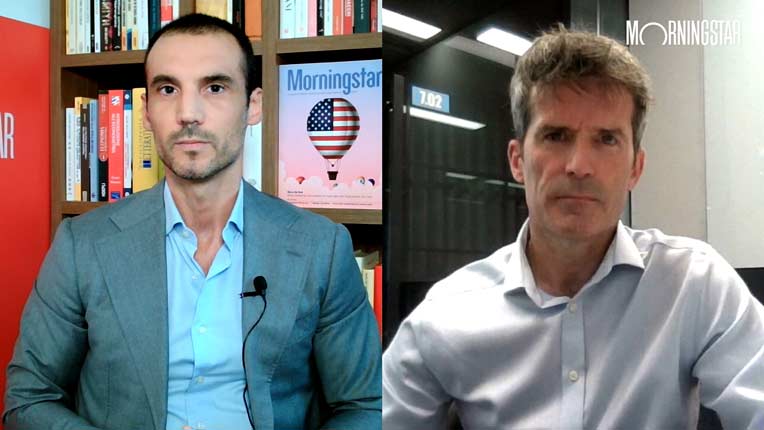
Argentina may have missed out on reaching the Rugby World Cup final but there's still some excitement left in its presidential race. This weekend's election was inconclusive so current economy minister Sergio Massa will go into a run-off on November 19 with the disruptor candidate Javier Milei. The ballot effectively suggests the status quo prevailing rather a victory for the outsider Milei.
Followers of Morningstar's special report weeks will remember Milei from our emerging market special this year year. Besides wielding chainsaws at rallies and showing his dog collection on TikTok, he's in favour of ditching the Argentina peso for the US dollar. This was unusual because the developing world is generally trying to sidestep the US dollar for reasons political and economic. Milei also wants to disband Argentina's central bank.
"Milei may have a plan and be willing to act boldly, but his election would raise governability risk. [He] has limited experience in government, his party will hold a small number of seats in congress, and his radical policy ideas, including eliminating the central bank and dollarising the economy, could face stiff pushback from the opposition," says Morningstar analysts in a note published on October 23.
What if the economy minister wins on November 19?
A Massa victory, meanwhile, presents a different set of risks, according to Morningstar ratings agency DBRS.
"Massa has campaigned as a pragmatic consensus builder. He may be able to build a coalition and allay social unrest given the Peronists' national connections and strong political base. But if elected, it is unclear if Massa would be willing to break with the past and move with the necessary speed and force to correct the imbalances. If not, pressures toward a disorderly adjustment would continue to build," its analysts say.
Argentina is often used a byword for political chaos, currency collapse and debt default (most recently in 2020); the opposite of a EM poster child. Inflation in the country is in triple digits and interest rates are at 133%. Argentina works closely with the International Monetary Fund over debt negotiations, and with little wonder.
Many foreign investors have steered clear of the country in the last decade for these reasons, even it's one of the largest in South America. Certainly Brazil has overtaken its footballing rival (if not on the pitch) and vastly outnumbers Argentina in terms of funds, whether open-ended or exchange traded.
There are six Brazilian funds available for sale in the UK but no Argentinian ones; it’s a similar story for open-ended funds. To pick a random fund example among Morningstar rated funds, JPM Latin America has a 55% weighting to Brazil but no exposure to Argentina, according to its latest fact sheet. Mexico is the next biggest weighting of this Bronze-rated fund, with 30% invested in the country. Likewise, from the investment trust space, BlackRock Latin America has no Argentina exposure but a near 60% weighting to Brazil.
Brazil has had its own political uncertainty in recent years but has so far shown some stability in the second iteration of the Lula presidency.
Stock Market Gains May Be Deceptive
Argentina's currency may still be extremely volatile but its domestic stock market has been powering ahead this year, following on from three years of gains. The country's Merval index is up more than 400% in a year.
Returns in local currency look impressive because of the peso's steep decline, meanwhile: $1 bought you 150 pesos in October 2022. It now buys you 350.
Stripping out currency weakness still gives some decent returns. Morningstar doesn't have a specific Argentina index but the equivalent MSCI index is up 22% in dollar terms this year (to the end of September), comfortably beating the benchmark MSCI Emerging Market index, which is up around 2% this year. This follows a 35% gain in 2022, versus the EM benchmark's -20%. Note: the comparison is not strictly fair as Argentina became a "standalone" market in 2021, so doesn’t feature in the EM index.
We've seen this before, though. In Turkey, rampant inflation has likewise been accompanied by a surging stock market. This seems counterintuitive because we tend to equate an economy doing well with equity market returns. But when inflation grips a country, there's no incentive for people to put money in the bank. That makes more speculative uses of cash more attractive.
A Long Road Ahead?
Away from superficially-alluring numbers, it's clear the country's "structural reform" has some way to go to convince investors, and particularly those who would buy its sovereign debt. For reference, Argentina has a CCC- rating from S&P Global Ratings and CCC from Morningstar DBRS, below Ukraine, Mali and Cuba. It's clear the country is not just "another EM" and is a special case in many ways.
DBRS analysts don't shy from the difficulties faced by the country in the years ahead:
"Whoever wins the presidency will inherit an economy on the brink," they say.
"The current policy mix has led to large and unsustainable macroeconomic imbalances. The central bank has run out of reserves. Inflation increased at an annualised pace of 225% in the last three months. The informal exchange rate is now about three times the official rate. All of this suggests that a large currency depreciation awaits the next administration, which will add fuel to the inflationary fire."
ING’s global head of markets, Chris Turner, and EM sovereign strategist, James Wilson agree:
"Argentina's macro challenges appear enormous regardless of its government and have only grown in recent years, despite securing a sovereign debt restructuring agreement with bondholders after defaulting in 2020," they say.
"The country is stuck in a vicious cycle of soaring inflation and foreign exchange depreciation, with the central bank required to intervene in the currency market to avoid excessive currency weakness while also providing monetary financing for the fiscal deficit. Somewhat understandably, consumer and business confidence remain depressed, with a deep recession expected for 2023."
What about the plan to ditch the peso and embrace the greenback? Even if the outsider candidate were to prevail, which now looks less likely, ditching the peso would be a tough ask, Turner and Wilson say.
"For credible dollarisation to take place, it would have to be backed up with strong and credible fiscal guarantees. Dollarisation might remove the risk of a currency devaluation, but it does not remove the risk of sovereign default – the latter only too familiar to Argentina.
"It would seem to be in everyone's interests if a credible exchange rate system backed by a strong fiscal position could be employed as soon as possible. Most seem to think that dollarisation could not see the light of day since any Milei administration would lack the support in the Chamber of Deputies to advance this policy."





























